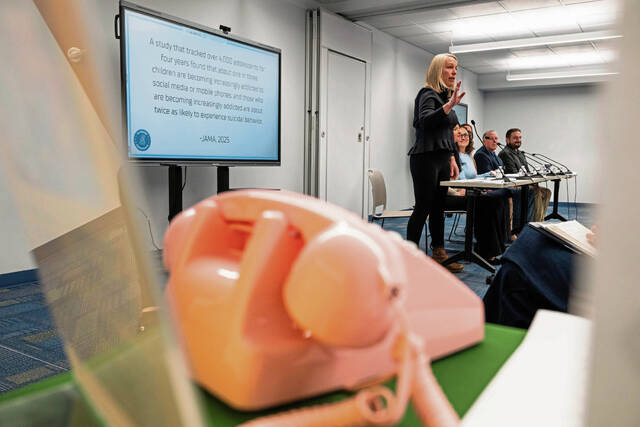The Pennsylvania Superior Court, in a strongly worded decision, ruled that a lawsuit filed by the parents of a 13-year-old Mt. Pleasant boy who was killed accidentally when his friend fired a gun at him can move forward.
It is the first appeals court in the country to find that the federal Protection of Lawful Commerce in Arms Act is unconstitutional and could, ultimately, have sweeping ramifications on suits brought against gun manufacturers.
“It is a huge deal,” said Jonathan Lowy, chief counsel for the Brady Center to Prevent Gun Violence, who argued the case on behalf of Mark and Leah Gustafson.
The Gustafsons filed the complaint against Springfield Arms and Saloom Department Store in 2018, alleging negligence and strict liability for the manufacture and sale of a defective handgun.
J.R. was at a home in Westmoreland County on March 20, 2016, when his 14-year-old friend obtained the homeowner’s handgun and removed the magazine. Believing the gun was unloaded, John Burnsworth III pulled the trigger and shot J.R.
Burnsworth ultimately pleaded delinquent in juvenile court to involuntary manslaughter and served more than a year at a Cambria County reform school before his release.
In their lawsuit, the Gustafsons argued that the gun that killed their son had a design defect because it lacked a safety feature that would disable it from firing without a magazine inserted.
However, the defendants filed preliminary objections and asserted immunity under the federal Protection of Lawful Commerce in Arms Act.
Westmoreland County Common Pleas Judge Harry F. Smail threw the case out, agreeing with the defendants that the act prohibited the lawsuit.
The Gustafsons appealed, arguing that the act is unconstitutional.
In a 63-page opinion filed Monday in Superior Court, a three-judge panel agreed that it is.
The “Act is unconstitutional in its entirety,” Judge Deborah A. Kunselman wrote. “The only portions of the (act) that do not offend the Constitution are its findings and purposes … and a few definitions.”
Instead, she said, it was an act of “constitutional overreach” and a violation of the 10th Amendment, which gives power, such as the tort reform intended by the act, to individual states.
According to the court, the act in question says that a “qualified-civil-liability action may not be brought in any federal or state court” against members of the gun industry. Such a lawsuit “shall be immediately dismissed by the court in which the action was brought or is currently pending.”
There are enumerated exceptions in the act, which did not apply in the Gustafson case.
Instead, the Superior Court chose to address the constitutionality of the act, which was passed in 2005 after intense lobbying in Congress by the gun industry. Kunselman noted in the opinion that guns kill approximately 30,000 people annually.
“The act immunizes the gun industry from every conceivable type of joint and comparable liability known to the common law,” the court wrote, even if a product is faulty and causes harm.
The act, the opinion continued, is unsustainable, because “it grants the gun industry immunity regardless of how far removed from interstate commerce the harm arises.”
“Critically, neither J.R. nor his parents purchased the gun used to kill him, i.e., they did not engage in commerce of any kind. Hence, there was no existing commercial activity between the Gustafsons and the gun industry at the time of J.R.’s death for Congress to regulate,” Kunselman wrote.
”We hold that merely because, at some point in time, that gun passed through interstate commerce, does not give Congress perpetual authority to regulate any harm it may cause.”
Instead, the use or misuse of a product should revert to a local matter, subject to state regulation, the court wrote.
“This is especially true where, as here, the product kills someone who did not even purchase it.”
The case was defended in Superior Court by the U.S. Department of Justice and is now remanded to Westmoreland County Common Pleas Court to continue.
A spokeswoman for the U.S. Attorney’s Office in Pittsburgh declined to comment. The defendants in the lawsuit can appeal to have the case heard by a larger panel of the Superior Court or seek review by the Pennsylvania Supreme Court.
“I’m extremely confident this court is correct,” Lowy said. “It’s just patently unconstitutional, and there’s no real good defense to it.”








